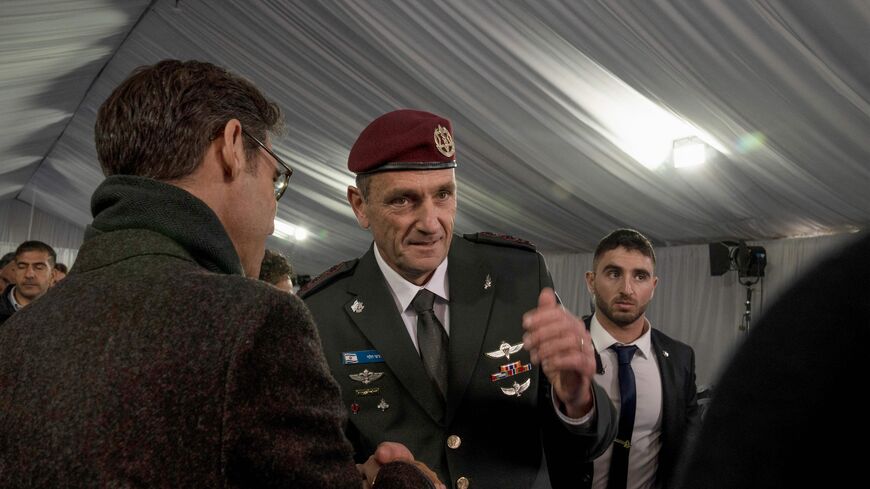TEL AVIV — Israeli security chiefs have become especially worried recently, not only over Iran’s moves to enrich uranium, but also on Tehran's rapidly growing capabilities to launch a military nuclear attack.
Even in amid speculation about a US push to forge a historic peace between Israel and Saudi Arabia, Israel’s top commander sounded an ominous warning. Speaking on May 23 at the annual Herzliya Conference, Lt. Gen. Herzl Halevi warned of negative developments that could lead to Israel taking action against Iran.
“Iran has made more progress in uranium enrichment than ever before. We are also closely examining other aspects of the [Iranians’] path to nuclear capability,” said Halevi. “Without going into details, there are possible negative developments on the horizon that could prompt action.”
Halevi is not prone to exaggeration. His unusual reference to “action” and “negative developments” sent Israel’s stock market and currency exchange rate tumbling.
The latest dramatic news on the Iranian threat emerged two months ago, on March 23, when Joint Chiefs of Staff Chairman Gen. Mark Milley told Congress that Iran could make enough fissile material for four or five nuclear bombs in “less than two weeks,” an assessment with which Israeli intelligence is well acquainted. What stunned Israel’s defense establishment was Milley’s claim that once Iran produces sufficient military-grade uranium, it could put together a nuclear weapon within “several more months.”
This timetable is dramatically different than Israel’s assessment that Iran is still far from having the technology to produce a warhead the size of a basketball and mount it on a missile with a range of hundreds or thousands of kilometers. In fact, Israeli and American experts had until recently spoken in terms of Iran being two years away from such capability. Some in Israel are describing Milley’s shocking timetable as a potential intelligence failure of Pearl Harbor proportions.
"Either Gen. Milley is wrong and the Americans fell short with their assessment or we just fell asleep on our watch," a former senior Israeli intelligence source told Al-Monitor on condition of anonymity.
Immediately after Milley’s congressional testimony, a hotline was set up with his Israeli counterpart Halevi. The US and Israeli intelligence establishments share high-level intelligence, and the Israelis sought to understand what Milley had based his comments on.
At the same time, Israeli intelligence is working to determine the precise stage of Iran’s nuclear weapons development. Israel is now worried over Iran advancing on its "weapons group," meaning the development of the special detonation process required to occur to achieve a nuclear explosion. Halevi’s remarks this week about “negative developments” appear to indicate that Israel cross-checked its own information with the American data.
"These are perhaps not standard military-level nuclear warheads," a former Western intelligence source told Al-Monitor on condition of anonymity. "It may be that the Iranians have a way to assemble a different kind of bomb, but what is certain is that they have made real progress on the issue of nuclear weapons capability behind the back of the entire world."
According to one assessment, different groups of Iranian experts have been tasked with addressing different weaponization technology challenges at the same time, in a parallel process rather than serial order. Intelligence experts have always known that weaponization is harder to track than uranium enrichment activity, which has a significant intelligence stamp. One way or another, Israel is also beginning to realize that Iran is within touching distance of being defined as a nuclear threshold state.
The day before Halevi’s remarks, the head of Military Intelligence, Maj. Gen. Aharon Haliva, focused his conference presentation on Iran's main partner in the Middle East, Hezbollah Secretary-General Hassan Nasrallah. Even as Iran appears to be progressing toward realizing its nuclear ambitions, Israel has detected an erosion of its deterrence vis-a-vis Hezbollah. Haliva hinted that Israel knows of Nasrallah’s involvement in dispatching the attacker who infiltrated Israel from Lebanon and attempted to carry out a major bomb attack on March 13, adding that Israel knows what Nasrallah is planning even now.
“He [Nasrallah] is no longer afraid,” a senior Israeli diplomatic source told Al-Monitor on condition of anonymity. "It's not that he wants to go to war with Israel — he knows what such a war would mean for Lebanon — but he's no longer as careful as he was,” in the 16 years since Israel destroyed Hezbollah’s stronghold in Beirut’s Dahiya quarter during the Second Lebanon War.
“Nasrallah is willing to take risks when it comes to attacks. He smells the Israeli weakness like all the other players in the neighborhood, especially given the internal situation," said the Israeli diplomatic source, referring to the mass pro-democracy protests sweeping Israel since January against government efforts to weaken the judiciary.
Assessments of Iran’s nuclear program advances were bolstered by fresh satellite imagery revealed last week in Israeli and other media, which are said to show that Iran is completing construction of a new infrastructure facility 80 meters (262 feet) below ground.
“Such depth will provide them with immunity from the latest US bunker-busting munitions,” an Israeli intelligence source told Al-Monitor on condition of anonymity. “If you put together all these data, you get a real strategic alarm.”
Former Israeli military Chief of Staff Lt. Gen. (Ret.) Gadi Eizenkot, now an opposition Knesset member, talked to Al-Monitor this week about the situation. "Everything that has now been exposed proves conclusively how bad and disastrous was the decision that [Prime Minister Benjamin] Netanyahu, [then-Israeli Ambassador] Ron Dermer and [then-Mossad Chief] Yossi Cohen pushed for the United States to withdraw from the nuclear agreement with Iran. The agreement was not perfect and had quite a few shortcomings, but it rolled Iran's nuclear program backward and froze it in place. Now we're in a completely different place."
The next Israeli and US moves are unclear. Israel has rejected a recent American suggestion, as reported by Axios, of engaging in joint military planning regarding Iran, fearing its sole purpose was to keep close tabs on Israeli moves in order to ensure that it does not embark on solo action against Iran. An American official told Axios that joint planning did not mean engaging with Israel in military planning against Iran. The current state of play is reminiscent of Israel’s reported preparations for a military strike on Iran over a decade ago, which also set the United States on edge, although it did not materialize. Any such action these days would be far tougher for Israel to carry out.







